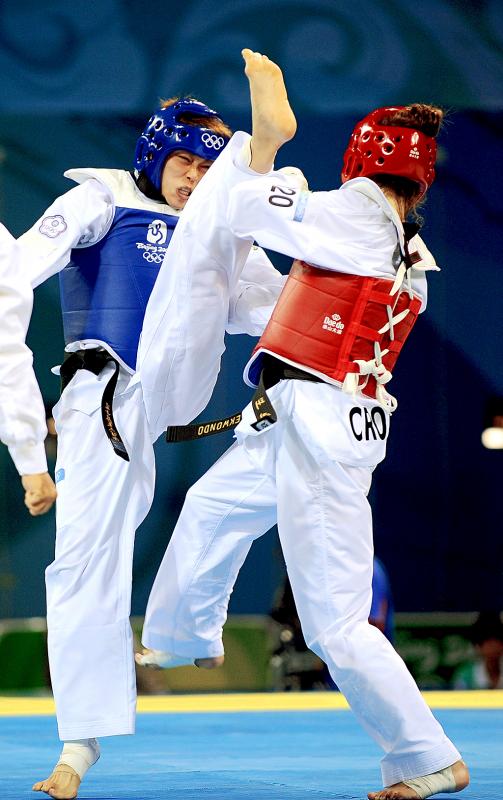Uncertainty grips next year’s postponed Tokyo Olympic Games: Will there be fans or empty stadiums in 14 months? How will thousands of athletes, staff members and technical officials travel, be housed and stay safe amid the COVID-19 pandemic?
And the Tokyo Games are not the only event.
China, where COVID-19 was first detected, is to hold three mega-sports events in the year after the Tokyo Olympics are set to close.

Photo: EPA-EFE
The World University Games in Chengdu, China, are to open, with up to 8,000 athletes, only 10 days after the Tokyo Games close.
Next come the Beijing Winter Olympics beginning on Feb. 4, 2022, and the Asian Games in Hangzhou, China, from Sept. 10.
The previous edition of the Asian Games, hosted by the Indonesian cities of Jakarta and Palembang in 2018, drew 11,000 athletes and featured more sports than the Olympic Games.

Photo: Jung Yeon-je, AFP
A fourth major event, soccer’s 24-team Club World Championship, was to open in China in June next year, but it has been postponed because of scheduling conflicts created by the pandemic.
China is a go-to country for these mega-events, through expertise gained from the 2008 Beijing Olympics and because it absorbs the massive costs.
The country spent at least US$40 billion to organize the 2008 Olympics, and there was no national debate since the authoritarian state prohibits voting or referendums.
Europeans and North Americans have repeatedly voted down referendums to host the Games.
China landed the 2022 Winter Olympics when several European bidders withdrew. Beijing won narrowly in a vote by the International Olympic Committee (IOC) against Almaty, Kazakhstan.
“Telling the citizens of Bavaria or Switzerland that another Winter Olympics would benefit them greatly doesn’t work,” said Jonathan Grix, who studies sports policy at Manchester Metropolitan University.
“Voters sense that citizens rarely benefit the most from such events,” Grix added. “Authoritarian states have no need to ask the populace, they have no need to compromise on policy, there is no political opposition (by definition) and most delivery services are state-run, ensuring the smooth running of the event.”
Japanese and IOC officials have given few details about how the Tokyo Olympics are to be staged, the cost of postponement or who is to pay for the delay, but they have teased the problems and floated tenuous solutions.
One thing has been decided: If the Games cannot open on July 23 next year, they are to be canceled.
In a joint news conference last weekend, WHO Director-General Tedros Adhanom Ghebreyesus said that it would not be “easy” to make the Olympics a safe global gathering spot, but added with confidence: “I think it’s possible.”
IOC president Thomas Bach has been cautious in speculating how the Olympics can be held.
He has suggested a possible quarantine for athletes, hinted at limited fan access to venues, and has not ruled out events in empty stadiums.
Of course, Bach adds that empty stadiums is not his preferred solution.
IOC member John Coates, who oversees preparations for Tokyo, has been direct.
“We’ve got real problems because we’ve got athletes having to come from 206 different nations,” Coates said, speaking at a News Corp Australia digital forum. “We’ve got 11,000 athletes coming, 5,000 technical officials and coaches, 20,000 media. There are also about 4,000 working on the organizing committee and an expected 60,000 volunteers.”
Some scientists in Japan and elsewhere believe that a vaccine is needed to guarantee safety for athletes, while some have questioned whether young, healthy athletes should be a priority for vaccination.
Another challenge is guaranteeing the safety of fans, who have bought millions of tickets.
If there are no fans, will there be refunds? Will there be lawsuits?
Tickets provide at least US$800 million in revenue for local organizers, whereas the added cost of postponing the Tokyo Games has been estimated at US$2 billion to US$6 billion.
“Sponsors and business partners of the Games will have to keep investing extra money in their marketing programs for Tokyo if the games are postponed, potentially forcing them to reduce their budgets for the next Olympics,” former Chinese Olympic Committee secretary-general Wei Jizhong told the China Daily.
Sheena Greitens, who studies Asian politics at the University of Texas at Austin, said that large sports events give China high visibility and “can keep reporters focused on the sporting events rather than having them use their time in-country to dig around on other topics that might reflect poorly on the CCP [Chinese Communist Party].”
“They provide a way for China to boost its cultural and ‘discourse power’ globally,” Greitens added.

Santiago Castro on Tuesday had an immediate impact off the bench as he scored the goal to send Bologna into the Coppa Italia semi-finals for the first time in 26 years. Bologna won 1-0 against last year’s runners-up, Atalanta BC, and are to play either holders Juventus or Empoli in the final four. Juventus are to host Empoli in their quarter-final on Feb. 26. The last time Bologna reached the semi-finals was in 1999, when they lost 4-2 to ACF Fiorentina. There were chances for both sides in a high-tempo match in Bergamo, but it was Bologna who broke the deadlock 10 minutes from

The former interpreter for baseball star Shohei Ohtani on Thursday was sentenced to nearly five years in prison for bank and tax fraud after he stole nearly US$17 million from the Los Angeles Dodgers player’s bank account. Ippei Mizuhara, who was supposed to bridge the gap between the Japanese athlete and his English-speaking teammates and fans, was sentenced in federal court in Santa Ana to four years and nine months after pleading guilty last year. He was ordered to pay US$18 million in restitution, with nearly US$17 million going to Ohtani and the remainder to the US Internal Revenue Service. He was

The 40-year-old LeBron James on Thursday became the oldest player to score 40 points in an NBA game, putting up a season-high 42 in the Los Angeles Lakers’ 120-112 victory over the Golden State Warriors. James passed the record held by Michael Jordan, his idol and the only other NBA player to score 40 after his 40th birthday. “I’m old, that’s my take,” James said when asked about his latest achievement. “I need a glass of wine and some sleep, that’s what I think.” Jordan did it for the Washington Wizards just three days after turning 40 in February 2003. James is 38

SPEEDSKATER: Her bronze medal ended Taiwan’s run at the Asian Winter Games without a medal since the nation first participated in the second iteration in 1990 Speedskater Chen Ying-chu yesterday made history as the first athlete representing Taiwan to secure a medal at the Asian Winter Games. Competing at the HIC Speedskating Oval in Harbin, China, Chen clocked 10.510 seconds in the women’s 100m event, finishing third behind South Koreans Lee Na-hyum and Kim Min-sun, who posted times of 10.501 and 10.505 seconds respectively. Her bronze medal ended Taiwan’s drought at the Asian Winter Games since the nation first participated in the second iteration in 1990. This year’s Games mark Chen’s debut at the event. Previously excelling in roller speedskating, she won six medals at world championships before transitioning